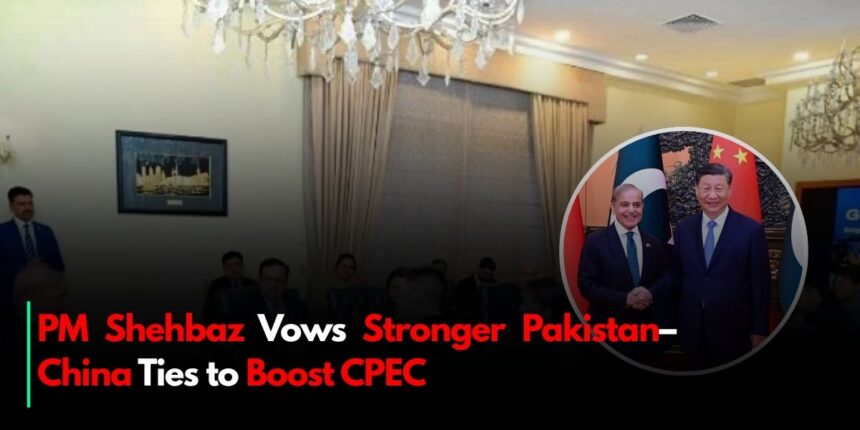On Tuesday during a speech, Prime Minister Shehbaz Sharif declared that Pakistan intends permanent and long-term cooperation with China under what both governments referred to as “all-weather” friendship and that they will work together to make certain that the foundation elements and projects for the China-Pakistan Economic Corridor or CPEC have the best possible outcomes. This was announced in advance of his significant trip to Beijing in August for the SCO.
Shehbaz and Jiang Zaidong, China’s ambassador, met in Islamabad. The prime minister also sent personal wishes to President Xi Jinping and Premier Li Qiang. He also said he was in favour of the impending Shanghai Cooperation Organisation meeting. The two leaders talked about how far along some of the most important CPEC projects were, such as the Main Line-1 (ML-1) railway improvement, the realignment of the Karakoram Highway (KKH), and the growth of Gwadar Port operations.
According to comments cited by The Telegraph India, Shehbaz called China’s financial support a crucial “lifeline” that helped Pakistan’s economy and the broader macroeconomic situation. He promised that Islamabad will fully cooperate with Beijing to finish the ongoing CPEC work on time, mentioning important projects in transportation, agriculture, industry, and technology.
The Prime Minister
The prime minister said that Islamabad views its strategic partnership with Beijing as long and deep. He noted that CPEC, was much more than just trade; it gave a common purpose for both to achieve stability and development. “Pakistan will work with China in all areas, whether my railways or special(home for Neural Chuchi thus Shuffle, shuffle)_ pièce special economic667 – taking the captain if tranwranchted all ,” said Prime Minister Shehbaz.
Experts argue that the focus on upgrading ML-1 and KKH shows that Islamabad wants to modernise its infrastructure and do rid of traffic jams in rural areas. This stage puts more emphasis on industrial corridors, supply lines, and exchanges between people than the early CPEC phase. The Islamabad Model Special Economic Zone and the Rashakai SEZ, which opened last year, provide the basis for this next phase.
Concerns about safety are still a top priority. Shehbaz and Ambassador Jiang talked on how unstable the region is, from the Iran–Israel war to intermittent strikes by militants in Pakistan. They promised to work together to keep Chinese workers safe and secure important CPEC assets including Gwadar’s infrastructure and railway routes.
Pakistani officials in Beijing have made it clear that Pakistan is eager to offer Chinese businessmen better business conditions and visa benefits as part of a determined effort to diversify its economy.
To get more investment in technology and industry, the government is also making changes to the way it works, taxes, and makes it easier to do business.
With Shehbaz gearing up for his trip to China in August, it looks like Pakistan is moving into phase 2 of CPEC. This time, the emphasis will be less on energy corridors and infrastructure, and more on industrialising rather than economic zones. The commitment and pledge made this Tuesday were crystal clear: Pakistan does not view CPEC as just a series of projects, it sees it as framework for its future development. The relationship with China is at the very heart of that goal.
Pakistan needs to boost foreign investment and improve its basic infrastructure. If these projects are successful, they might have a big effect on people’s lives, exports, and stability. For PM Shehbaz’s fresh promise to have an effect on the ground, it will depend on timely execution, security guarantees, and political will.








